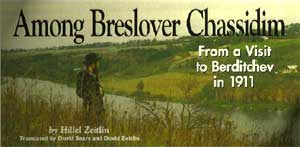It is tempting to intellectualize what I want to say here. It would be much easier, indeed much safer, than what I wish to do. I do not want to share an idea. Rather I want to reveal a small part of my soul, but if I do so, and put what I write out there, I leave myself open to getting hurt from those who see it and respond. Still, at least in this case, my desire to reveal a side of who I am, is deeper than my fear of getting hurt.
There are few individuals whose words, ideas, and feelings have moved me as deeply as those of Hillel Zeitlin ztvk”l. I am hardly an expert in what he has written, as I am still at the beginning of exploring his works. Still, he is one of the very few rabbis of whom I could imagine being a chosid, sitting eagerly at his feet, drinking in his every word. In his writing, both poetry and prose (which itself often borders on the poetic) he is so open, so full of depth and introspection, so clear about his desire to serve HaShem. Imitating the Kivyachol, he pours out his soul onto the page.
He was a ba’al teshuva in the deepest sense of the term. Born into a chassidic family in Homel he lost his faith after encountering biblical criticism, and philosophy. Yet he came back. Changed, I’m sure, but with the deepest of faith, faith that flows out of every word he writes. Even in the writings which were written before his return that I have read, there is depth through which one can almost feel his inner turbulence. I have not yet had the chance to read his words where he explains how he was able to return, as, sadly, in what is often the deepest (unintended) compliment, his sefarim have not been reprinted, and are not so easy to come by.
What can I take from his words? Dare I think that I can aspire to be like him in even the smallest way? What can I incorporate into my Avodas HaShem from this tzaddik who went to his death from the Warsaw Ghetto, wrapped in his tallis and tefillin, and clutching his beloved Zohar, like a modern-day member of the Aseres Harugei Malchus?
I have not struggled as he did, but it does seem to me that when one experiences a feeling of great distance from HaShem, that the gap is seldom bridged by returning to what one was. The struggle, the search, the panic, fear, and sadness, all combine to generate a new path. It is a path that can not be found in any other way. In his joyous service of the Ribbono Shel Olam, I see in him a confirmation of my hunch that this path, once reached, leads to something that makes all the struggle and doubt transform into worship and service and joy.

No comments:
Post a Comment